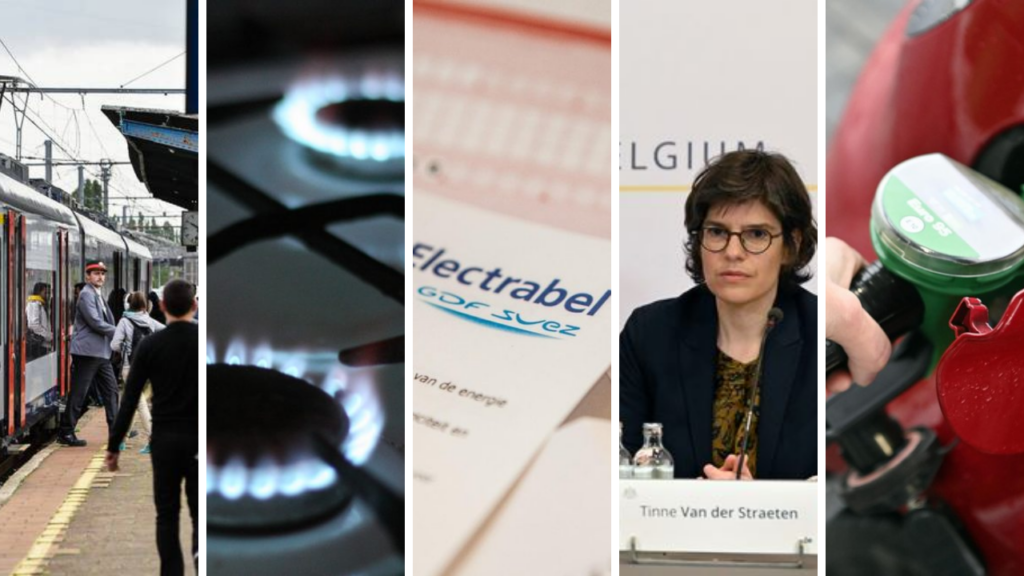With energy costs skyrocketing in the weeks after Russia's invasion of Ukraine, Belgium's Federal Government has adopted a new raft of measures to bring the situation under control, announced Prime Minister Alexander De Croo on Tuesday morning.
The measures include a reduction in VAT on electricity and gas, lower excise duties on diesel and petrol and a heating oil bonus, as well as an extension of the broad social rate. The government has earmarked €1.33 billion for the new energy package, on top of the €1.1 billion made available in February.
De Croo stressed that there is not currently a gas shortage in the EU but rather market volatility driven by uncertainty: "the wholesale gas markets are totally irrational; the prices are those of a scarcity in the market, but there is none." At the European level, De Croo called for the excess profits of energy producers to be slashed and for a "ceiling on European prices" to be introduced.
"I am in favour of a free market, but when it is completely out of touch with reality, you have to intervene. This is becoming the Wild West and we all pay the price," De Croo said, adding that the EU is expected to decide on measures next week.
Currently, Belgium's package includes the following measures:
Gas, electricity and fuel oil under residential contracts
- VAT on electricity at 6% until 30 September 2022
- VAT on natural gas at 6% from 1 April 2022 to 30 September 2022. This reduction will also apply to heating networks
- A one-off automatic reduction of €200 per household for all households that use oil, propane or butane for heating. Additionally, a one-off refinancing of the social fuel oil fund
- General social rate for natural gas/electricity extended until 30 September 2022
The €200 automatic reduction is granted per domicile (meaning per address), and comes on top of the previous heating allowance of €100, said Energy Minister Tinne Van der Straeten. This means that "every household will get a €300 reduction."
"Every extra euro we get, we give back to the population," she said. "But this is only a painkiller: a further energy turnaround is needed."
The government will also examine whether the surplus profits of energy companies can be creamed off and returned to Belgian electricity and gas consumers via the forthcoming European initiative. If a European initiative fails to come about the government can develop its own initiative in June 2022.
Mobility measures
The special excise duty on petrol and diesel will be temporarily reduced by 0.175 per litre (incl. VAT) as soon as possible, said Finance Minister Vincent Van Peteghem. In practice, this means that filling up a 60-litre tank will cost €10.50 less at the pump. The government is doing "everything possible to implement the excise reduction by this weekend," De Croo added.
"That means it will happen faster here than in the Netherlands or France, where the measures only take effect on 1 April."
Related News
- Cost of bread could 'quickly exceed €3', industry expert fears
- Heating oil prices drop by more than 28 cents from Saturday
- EU considers cap on gas prices to limit soaring energy prices
In the event of prices at the pumps falling below €1.7 per litre, excise duties will resume. A review is scheduled for mid-June 2022. From then on, monthly monitoring will be provided.
Belgium will freeze the price of train tickets, meaning it will not implement the 4.5% increases planned for July 2022. Instead, SNCB will be compensated for the corresponding amount of €13 million in 2022.
"More than ever, the train is the solution for green and cheap mobility and it must remain so," said Mobility Minister Georges Gilkinet. "That way, we can compete even better with the car, which is becoming more expensive due to rising fuel prices."
For businesses
Rising energy and raw material prices are also having a strong impact on business costs, prompting the government to ask the National Bank of Belgium to analyse the impact on the various sectors in more detail. On the basis of this analysis, the government will consult with social partners what policy measures can be taken, including with regard to energy bills.
For companies affected by the war in Ukraine and possible economic sanctions, the Federal Government is planning a system of temporary unemployment due to "force majeure" from 1 April 2022 to 30 June 2022. This will operate along the same lines as the temporary unemployment measures in place for Covid-19, which expires on 31 March 2022.
"Sometimes you have the feeling that there is no end to the crises," said De Croo. "But just like during the Covid-19 period, this government is coming up with measures to ensure that we can get through this."

